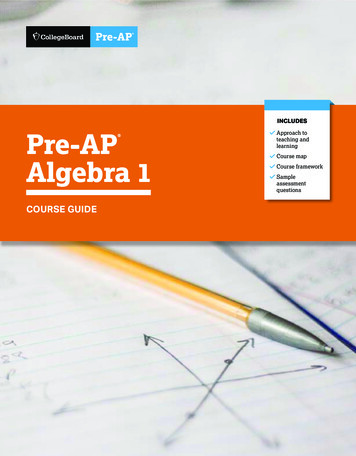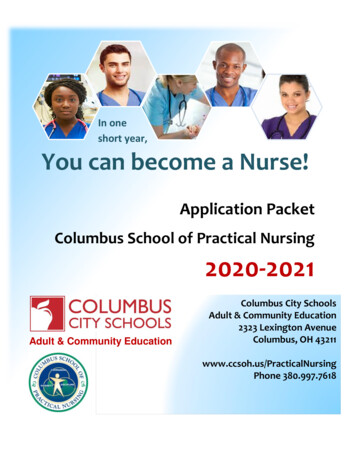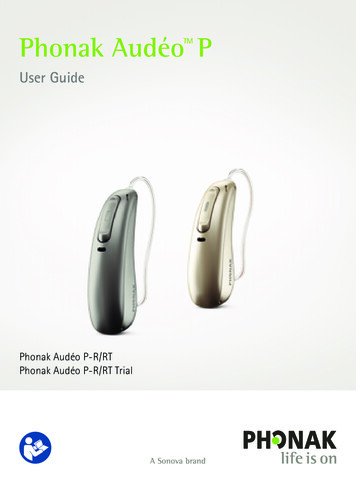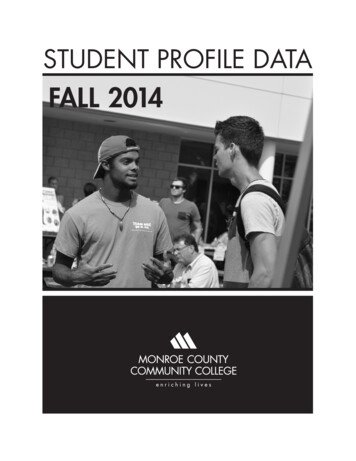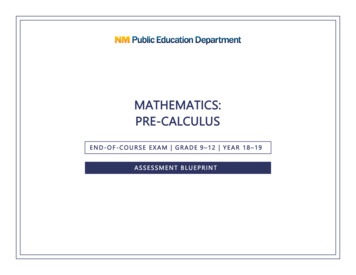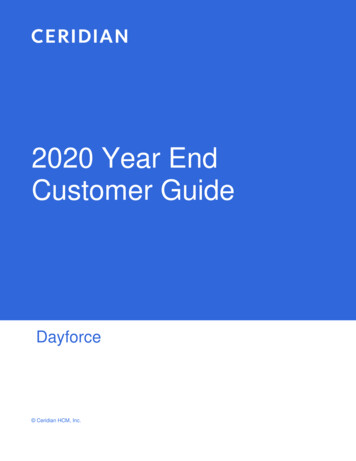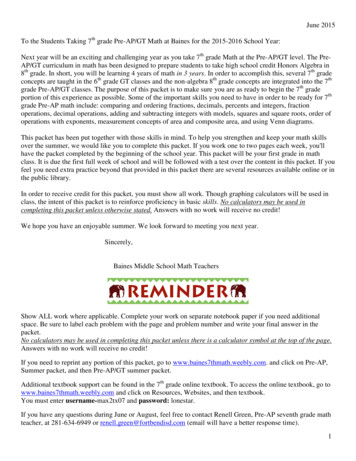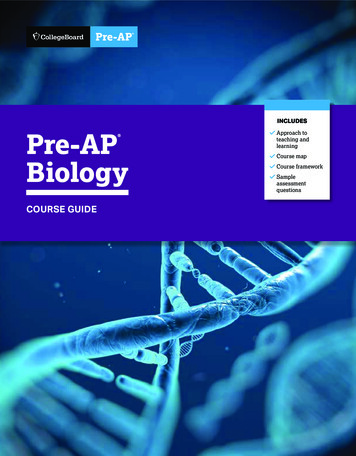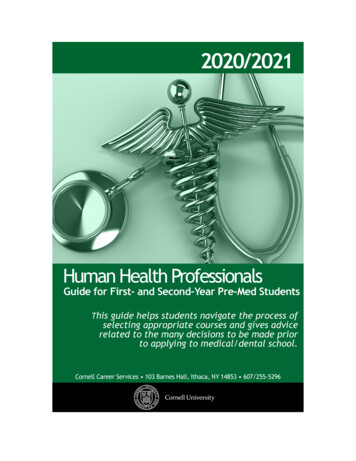
Transcription
2020/2021Human Health ProfessionalsGuide for First- and Second-Year Pre-Med StudentsThis guide helps students navigate the process ofselecting appropriate courses and gives advicerelated to the many decisions to be made priorto applying to medical/dental school.Cornell Career Services 103 Barnes Hall, Ithaca, NY 14853 607/255-5296
Prepared by:Chelsea Rule, Ph.D., Director of the Health Careers Advising ProgramWith the aid of:The Health Careers Program Advisory BoardThe Health Careers Advising NetworkWeill Medical College of Cornell UniversityAmerican Association of Colleges of Osteopathic MedicineAssociation of Schools and Colleges of OptometryAssociation of American Medical CollegesAmerican Dental Education AssociationAmerican Association of Colleges of Podiatric MedicineDouglas Lockwood, Manager, HCECJeremy Richards, Records Coordinator, HCECCornell Career Services StaffWith special thanks to: Kristine Goggan, Staff AssistantCopyrighted, 2020, Cornell Career Services, Cornell University. All rights reserved. No part of this publication may beused or reproduced without written permission from Cornell Career Services, Cornell University.Diversity and inclusion are a part of Cornell University’s heritage. We are an employer and educator recognized forvaluing AA/EEO, Protected Veterans, and Individuals with Disabilities.
Table of ContentsIntroduction1Frequently Asked Questions1MythBusters5Course Requirements8AAMC Core Competencies11Application Components11Your Conduct and Credit Rating14Year-by-Year Timelines14Timeline Illustrations16Laying the Groundwork for Strong Letters of Recommendation17Health Careers Advisors17Investigating Careers and Wider Reading19
IntroductionMany students enter Cornell University certain that they want to use their education to develop strong credentials for a healthcareer, while others decide on this career path after significant reflection and experience during the college years. The yearsspent at Cornell are a time for both the exploration of the curriculum and preparation for future careers. This Guide, along withthe health careers advisors, will help students navigate the process of selecting the appropriate courses and give advice relatedto the many decisions to be made prior to applying to medical or dental school.In the first year, the best way to prepare for any human health career is by focusing on two things: forming a support networkand managing your academic life. A strong support system makes it easier to navigate the initially unfamiliar and oftenunexpectedly rigorous intellectual terrain. Similarly, a strong start in academics brings confidence and facilitates building astrong support system. By taking coursework seriously from the first to the last days of each semester and seeking the guidanceavailable at Cornell, you will develop the confidence needed to continue preparing for professional school.Because medicine is a profession dedicated to the service of others, students should develop and demonstrate a strong serviceethic through varied experiences. Service to others may be inside or outside the classroom and can take many forms. Reflectionon experiences, both service and clinical, is critical for demonstrating the development of the qualities of a health careprofessional. Demonstrating evidence of integrity, ethics, professionalism, written and oral communication, servicemindedness, and understanding of the health care field on applications to professional schools and in interviews is essential.The path to a career in medicine requires students to engage in careful planning and preparation, including reflection, and toseek guidance with important decisions. The successful medical or dental school applicant uses the Cornell years to developstrong academic credentials, a demonstrated commitment to the field of healthcare and the service of others, and theinterpersonal skills needed by future healthcare professionals.Frequently Asked QuestionsWhat distinguishes Cornell’s applicant pool to professional schools?Each year around 400 undergraduates and alumni from Cornell apply to one of many different health professionsschools. Our acceptance rate is about 25-30% higher than the national average.Which college should I enroll in?As a Cornell undergraduate, you may enroll in the courses that fulfill the requirements of medical schools, regardless ofcollege. Traditionally, Cornell undergraduate applicants to medical school have enrolled in the College of Agricultureand Life Sciences, the College of Arts and Sciences, the College of Engineering, or the College of Human Ecology. Yourchoice of college depends on your academic interests and goals; remember that academic success and engagement arelinked.What should I major in?Your choice of a major reflects your personal interests and professional orientation. Base your decision on what youwant to learn, not how others will view you. The strength of the academic credentials, rather than the major, is the bestpredictor of who gains admission to health professional schools. You are more likely to succeed at––and benefit from––subjects that interest and stimulate you. Health career graduate schools do not require, recommend, or favor anyparticular undergraduate major course of study, and Cornell does not have a pre-health career major. In majors offeredthroughout the university, you can complete the pre-professional requirements while at the same time exploring yourown interests. In this way, you exercise the option of discovering an alternative career.The Association of American Medical Colleges (AAMC) has stated, "Admission committee members know that medicalstudents can develop the essential skills of acquiring, synthesizing, applying and communicating information through awide variety of academic disciplines students who select a major area of study solely or primarily because of the1
perception that it will enhance the chance of acceptance to a school of medicine are not making a decision in their bestinterest.”Despite statements like the above, many students believe that medical schools prefer certain major areas. AAMC’snational data, however, refute this. In 2019, 40% of biological sciences majors, 48% of physical sciences majors, 47% ofmathematics and statistics majors, 47% of humanities majors, and 40% of social sciences majors who applied wereaccepted to and matriculated to medical school. The differences among percentages of acceptance by major are notsignificant, and major choice cannot be used to predict acceptance to medical school.How does my choice of major affect my first-year course choices?Those majoring in a science discipline may take one or two science and/or math courses each semester, depending uponthe recommendations of academic advisors. However, humanities or social science majors may want to take only onemathematics or science course during the first year in order to be able to experiment with courses from severaldepartments. Over four years, all the course prerequisites are available to all students needing them.What guidance does Cornell give health careers-oriented undergraduates?Cornell has a structured Health Careers Program. The Career Library and the Health Careers Advisor in Barnes Hallprovide information, orientation sessions, and advising for students in all colleges. The advisor has drop-in advisinghours and scheduled appointments, and can also be reached by e-mail and telephone. Advising information is alsoavailable on the Health Careers webpage accessed through Cornell Career Services: career.cornell.edu.Most of the questions that first-year, sophomore, and junior transfer students pose relate to academic requirements. It isbest to address these questions to an advisor in your college or major.College of Agriculture and Life Sciences, CALS Career Services, 140 Roberts HallCollege of Arts and Sciences, Ana Adinolfi, 172 Goldwin Smith Hall and Naya Sou, G17Klarman HallCollege of Engineering, Benjamin Martin, 180 Rhodes HallCollege of Human Ecology, Shaun Gendrue, 113 Academic Surge AOffice of Undergraduate Biology, 216 Stimson HallSeveral advisors are available depending on your question: Beth Howland, Megan Gallagher, JeffMcCaffrey, Laura Schoenle, and student peer advisors.This Cornell Health Careers Guide for First and Second Year Pre-Medical Students is shared at New Student Orientation andis available on the Career Services website.What courses should I take?Cornell course recommendations are based on two criteria: fulfilling prerequisites for most health career professionsand providing optimal background for standardized admissions exams, which test the knowledge gained fromundergraduate coursework.Professional schools have their own rules regarding courses they will accept. For details on a particular school’srequirements, students are advised to read the individual school’s web pages, check the Medical School AdmissionRequirements (MSAR) database or the ADEA Official Guide to Dental Schools, or contact admissions offices. Generallyspeaking, regardless of undergraduate major, professional graduate schools require specific undergraduatecoursework. Cornell offers all required courses, often in alternative formats, such as individualized instruction(sometimes called auto-tutorial) or lecture-based. While these prerequisites vary between professions, certain minimumrequirements are standard within each health profession. For medicine, for example, all general or introductory sciencecourses must include a lab component or offer an additional course that is lab only.2
The required and/or strongly recommended subjects, in alphabetical order, are:Anatomy/Physiology; often required for PA/NP; otherwise an electiveBiology, introductory; replacement with AP credit is discouragedBiochemistry; lab not requiredChemistry; general and organicMicrobiology; often required for PA/NP; otherwise an electivePhysics; generalEnglishMath: statistics and calculusSocial Science; introductory sociology and psychology (see pink pages in this guide)What are the precise Cornell course recommendations?See pages 8-9 in this Guide.What principles guide course selection and planning?Any of the courses outlined on pages 8-9 will fulfill the prerequisites for most health professions schools. Severalfactors, often competing, will guide course selection: balancing rigor with readiness to take on multiple prerequisites inthe first year at Cornell, your interest in the subject, test scores, high school preparation, experience in rigorous courses,options for a major, and academic goals. Placement in the right courses is very important. Cornell Courses of Studydescribes the courses; the academic advisor and the directors of undergraduate studies (DUS) in relevant departmentscan explain the differences among courses and can help you select your courses.What is the optimal sequence of courses?The recommended order in which to take these courses is: mathematics, chemistry or biology, and physics. Biology,chemistry, and mathematics need to be started by the sophomore year if you plan to apply to a health professionsschool at the end of your junior year for matriculation in the fall following graduation. Keep in mind, though, that lessthan 15% of all Cornell medical school applicants apply at the end of the junior year, and health professions schools arehappy to see alumni and senior applicants. These more advanced applicants often experience a selective advantage dueto the lengthy and comprehensive preparation they are able to demonstrate. Courses are usually (but not necessarily)taken during these years:First-Year Writing Seminars - first-yearGeneral Chemistry – first-year/sophomoreBiology – first-year/sophomoreMathematics – first-year/sophomorePhysics – sophomore/junior/seniorOrganic Chemistry – sophomore/juniorBiochemistry –junior/seniorMathematics – strong quantitative skills are essential for chemistry and physics.It is recommended that college mathematics precede physics.Psychology and Sociology – prior to taking the MCATCan I take required courses Pass-Fail or S/U?No. We do not recommend taking requirements for health professional school on a pass/fail, orSatisfactory/Unsatisfactory (S/U) basis. Medical/dental schools do not frequently accept S/U for prerequisite courses,though many will accept S/U during SP20 or SU20 semesters due to COVID-19, often on a case-by-case basis.3
Will Advanced Placement (AP) Biology credits fulfill prerequisites?Check with an advisor before making a decision to use AP Biology credit (see the Office of Undergraduate Biology website).Generally speaking, students are advised not to use AP Biology credit because evidence has shown that students whouse this credit may find themselves at a learning disadvantage in advanced courses.Also, some health professions schools will not accept AP credit, even if Cornell has accepted it. Students are then leftwith the choice to take an introductory course after completing most undergraduate requirements and before applying,to take additional upper-level coursework, or not to apply to those schools that refuse AP credit. Some schools advisestudents to pursue advanced courses in biology, chemistry, physics, or other sciences, which provide reinforcement ofprevious courses, even though they may have met the minimum science requirements while in high school.Are any other Advanced Placement (AP) credits accepted to fulfill prerequisites?With the exception of biology, most schools will accept AP course credit that has been approved and placed on theCornell transcript before graduation from Cornell. Check specific statements on medical and dental school web pages. Indeciding to use AP credit, keep in mind that many schools require a minimum of course-based lab work. Advancedplacement can almost never substitute for the requisite number of labs. When enrolling in advanced courses, make surethey have labs that will fulfill basic requirements.How do transfer students fulfill requirements?Transfer students should check that the courses they have taken at their previous college meet the requirements forentrance to their chosen health professions school. Also, the “Transfer Student Guidelines” on the Health Careersportion of the Cornell Career Services website provides guidance.Can I take prerequisites as summer school courses?Required courses may be taken during summer session here or at other universities whose educational standards andrigor are comparable to Cornell's. In general, it is preferable to take these courses at Cornell during the regular schoolyear in order to demonstrate that you can perform well even while carrying a full course load. Your college advisingoffice can explain the procedure for attending summer school elsewhere.What courses should I take beyond the requirements?Students should work with their academic advisors in choosing courses beyond the requirements. Some studentsdecide to take courses similar to those taken in the health professions school in an attempt to demonstrate that they canperform well in the future environment, or to ease their studying during the first year of professional school. Theseadvantages, however, should be weighed against possible disadvantages. These include not being able to take anelective that may be important to your personal development and undergraduate education, which may not beavailable for you to take once you have graduated from Cornell.As you plan, also keep in mind that health professions admissions officers frequently speak of wanting to see bothbreadth and depth in a student’s academic record. In choosing courses, you will want to strike a balance, avoiding anarrow approach on the one hand and a superficial approach on the other.What is required for admission to health professional schools outside of academics?You will develop important qualities during your college years. Most important is what one Dean of admissions calls "asustained commitment to excellence." Becoming a well-educated person with an understanding of human nature,developing the ability to think critically, imaginatively, and logically, and gaining personal competency in several areasoutlined by the AAMC will make you a strong candidate. For more information on the core competencies, see thecorresponding section in this Guide.Your activities inside and outside the classroom should develop and strengthen interpersonal and intrapersonal skills,as well as your academic potential. You are not required to pursue activities in all areas, but service and clinical4
experience are the most important. It is also important to gain experience out of your “comfort zone” which, for manycollege students, is their campus environment.How do I learn more about the health care professions that interest me?Cornell regularly hosts healthcare professionals to speak with students on campus. Students should check Handshake,a service through which we send notices and reminders about these programs, via the Career Services webpage. Inaddition, our Alumni Connections Program (ACP), also administered through Cornell Career Services, matchesstudents with alumni in health careers for short exploratory externships. The same office helps you find longerinternships to gain research and clinical experience. You can identify alumni who are health profession practitionersthrough the online CUeLINKS service, and arrange conversations with them.How does Cornell help me gain admission to a health professions school?In addition to advising and programs for health career-oriented students, Cornell offers virtually boundlessopportunities for healthcare-related experience, both nationally and globally. We also provide abundant opportunitiesfor undergraduate research, for teaching experience, and for service learning as well as for studying in many differentcountries.When you are ready to apply, Cornell Career Services offers a Letter of Evaluation (LOE) service through the HealthCareers Evaluation Committee (HCEC). This LOE is a strongly recommended component of applications to mostschools of human medicine.Which standardized admissions test (MCAT, DAT, OAT, GRE) will I take?The Medical College Admissions Test (MCAT) assesses an applicant’s understanding of concepts in science courses inbiology, inorganic chemistry, organic chemistry, biochemistry, non-calculus-based physics, and social science courses inpsychology and sociology. The DAT also tests this knowledge, with the exceptions of physics and social sciencecourses.In light of this, the MCAT/DAT should not be taken until courses are completed (or are within a few weeks ofcompletion) and thorough preparation and study are complete. The best way to prepare now is to learn the material inyour prerequisites solidly and to read the MCAT/DAT website for updates about twice per semester. The MCAT/DATtests basic information and the Cornell curriculum will prepare you well. The MCAT is administered many times a yearat designated computerized test sites, and the DAT is available at multiple times throughout the year at similar sites.How do I stay informed about health career news?Students should create a Handshake profile (career.cornell.edu), indicate an interest in Health Careers, and permitHealth Careers Program emails to be sent to their address by signing up for “Health Careers Notifications” e-mails.Students should stay alert to announcements about other communication avenues, through departmentalcommunications, course announcements, etc.MythBustersMyth:Admission committees look unfavorably upon taking “bridge” years (aka “gap” years).Truth: Medical schools prefer for candidates to apply when they are sure about their dedication to the field of medicine andcan demonstrate readiness for medical school through academics, experience, and maturity. Many students use theyear(s) after graduation to explore career options or to improve their credentials through academic work, clinicalexperiences, or service opportunities. Medical schools do not look unfavorably upon applying after taking “bridge”years. In fact, the average age of the 2018 entering medical school class was over 24 years of age, clearly reflecting thatmany students apply after a bridge year or more.5
Myth:It will “look better” to medical schools if I double major or add another minor.Truth: In fact, an applicant’s primary undergraduate major has little to no effect on acceptance rates to medical school.National data from AMCAS show that if anything, there is a slightly lower acceptance rate for health science majorsversus other majors such as biology, chemistry, mathematics, or humanities. Cornell-specific data show no significantdifference in acceptance rates by College or by major. You should excel in what you do; the best way to do that is toundertake a course of study that is interesting and engaging, whether or not those courses amount to a double major ora minor. An applicant with one major and a 3.6 GPA is certainly more competitive than an applicant with a doublemajor and a 3.2 GPA.Myth:A high GPA will make up for a low MCAT score or vice versa.Truth: While academic credentials are certainly an important piece of a student’s application, they are just that, pieces of abigger picture. Many other factors, including letters of evaluation, letters of recommendation, experiences, personalstatement, and personal characteristics, will be evaluated in addition to the academic factors. Admissions committeesmay, however, question a “mismatch” between GPA and MCAT score (i.e. lower GPA and higher MCAT score orhigher GPA and lower MCAT score), because they value academic excellence in all arenas and test taking skills.Remember, medical education is "book-ended" by standardized exams, the MCAT and the USMLE, and admissionscommittees need to have the confidence that students will succeed in medical school and beyond.Myth:I can take challenging courses over the summer or plan light semesters to maintain a high GPA.Truth: Medical schools review an applicant’s academic performance as a whole and on a semester-by-semester basis. Studentsshould not plan light semesters with the aim of maintaining a high GPA as schools will note the avoidance of takingchallenging courses during the regular semesters or while taking other challenging courses. Schools may allow someleeway or may be impressed by high achievement during a particularly challenging semester, however. Studentsshould plan to take pre-requisite courses during the regular semesters, if at all possible.Myth:It doesn’t matter when I get clinical experience. I can do this right before I apply.Truth: The motivation for requiring students to gain clinical experience prior to applying to medical school is to ensure thatstudents are well-informed and committed to the field of medicine and to the service of others. This commitment needsto be sustained and demonstrable through a student’s application. You should be able to answer the question, “Why doyou want to be a doctor?” using concrete examples and experiences. It is not enough to have family members or closefamily friends that are in the medical field. Your experiences need to demonstrate your motivation for this career path;pressure from family or friends is not enough.Myth:If I am driven enough, I will be admitted to medical school one day.Truth: Admission to medical school is an extremely competitive process. In 2019, 53,371 students applied for the 21,869available first-year seats in medical school, a 41% acceptance rate. Nationally, the average number of applications filedper applicant was over 15, leading to large numbers of applications filed at each of the medical schools. For example,Weill Cornell Medicine received over 7,000 applications in 2019. Some schools receive many more than that. A strongmotivation is not enough to gain admittance to medical school. Because the process is so competitive, students shouldbe prepared with an alternate career path, which may also be in the healthcare field. There are also postbaccalaureateacademic record enhancement programs for those looking to improve their academic credentials, but these are verycostly and do not ensure admission to medical school. If you have experienced challenges during your Cornelleducation, please speak to a Health Careers Advisor.Myth:Applying to medical school is just like applying to undergraduate institutions.Truth: The application process, including standardized examinations, common application platforms, personal statements,and letters of recommendation, make the two processes seem very similar. In reality, these processes could not be moredifferent. In fact, more than 80% of all undergraduate institutions accept more than half of their applicants, and mostapplicants receive at least one offer of admission, usually more. In contrast, the acceptance rates to individual medicalschools range from less than 1% for private institutions to approximately 3% for in-state applicants to public institutions– in contrast to 4.8% for the most selective undergraduate institution (Curtis School of Music, Philadelphia, PA).6
Undergraduate institutions such as Cornell are very selective, but applicants to Cornell were, most likely, also acceptedto another undergraduate institution. Receipt of multiple acceptances, while expected during the process ofundergraduate admissions, is much less likely during the medical school application process. In 2019, of the Cornellstudents who were accepted to schools of allopathic medicine, 35% were accepted to one school, 22% were accepted totwo schools, 15% were accepted to three schools, 11% were accepted to four schools, and 17% were accepted to five ormore schools. Thus, over half of those accepted to medical school were accepted to 1 or 2 schools.7
Cornell Courses that Satisfy Most Medical and Dental School RequirementsSubjectBiologyCornell University CoursesOffered fall, spring, and summerBIOMG 1350 Introductory Biology: Cell and Developmental BiologyAND BIOG 1440 or 1445* Introductory Biology: Comparative Physiology*BIOG 1445 is an individualized instruction format course.AND BIOG 1500 Investigative Biology LaboratoryAny of the following:Biochemistry BIOMG 3310 Principles of Biochemistry: Proteins and Metabolism (offered fall)AND BIOMG 3320 Principles of Biochemistry: Molecular Biology (offered spring) BIOMG 3300 Biochemistry, Individualized Instruction (offered fall, spring) BIOMG 3350 Principles of Biochemistry: Proteins, Metabolism, and Molecular Biology (offered spring) NS 3200 Introduction to Human Biochemistry (offered fall) BIOMG 3330 Principles of Biochemistry: Proteins, Metabolism, and Molecular Biology (offered summer)Although not required, students find that taking courses in the following areas useful in understanding advanced conceptsand providing greater depth of preparation for MCAT exams:Upper-LevelBiology BIOMG 2800 Genetics Lecture (offered fall, spring, summer)o BIOMG 2801 Genetics Lab (offered fall, spring, summer) BIOMI 2900 General Microbiology Lectures (offered fall, spring, summer) NS 3410 Human Anatomy and Physiology (offered spring)o NS 3420 Human Anatomy and Physiology Laboratory (offered spring)Other courses in the areas of cell biology, evolutionary biology, genetics, microbiology, neurobiology, behavior, nutrition,and physiology may be useful. Students are encouraged to consult with a health careers advisor or academic advisor toselect courses.Visit remedical-students for more information on General Chemistrycourse options. Some options include:Option 1CHEM 2070 General Chemistry I (offered fall, summer)AND CHEM 2080 General Chemistry II (offered spring, summer)General ChemistryOption 2CHEM 2150 Honors General and Inorganic Chemistry (offered fall)o Accelerated one-semester course leading directly to organic chemistryo An AP score of 5 on Chemistry or instructor permission is requiredo Most medical schools require a full year of general chemistryOption 3For Engineering Students OnlyCHEM 2090 Engineering General Chemistry (offered fall, spring)AND CHEM 2080 General Chemistry II (offered spring, summer)OR CHEM 2150 Honors General and Inorganic Chemistry (offered fall)Organic ChemistryOption 1CHEM 3570 Organic Chemistry for the Life Sciences (offered fall, summer)AND CHEM 3580 Organic Chemistry for the Life Sciences (offered spring, summer)AND CHEM 2510 Introduction to Experimental Organic Chemistry (offered fall, spring, summer)Option 2CHEM 3590 Honors Organic Chemistry I (offered spring)AND CHEM 3600 Honors Organic Chemistry II (offered fall)AND CHEM 2510 Introduction to Experimental Organic Chemistry (offered fall, spring, summer)8
OrganicChemistry, cont’d.EnglishOption 3CHEM 3530 Principles of Organic Chemistry (offered fall)AND CHEM 2510 Introduction to Experimental Organic Chemistry (offered fall, spring, summer)o A single-semester organic chemistry courseo Some medical schools require a full-year of organic chemistryo Schools that do not require a full-year organic chemistry sequence usually require a one-semesterbiochemistry course and may also require biochemistry lab.Students are encouraged to explore requirements of medical schools before enrolling in this course.Most medical schools will accept First-Year Writing Seminars (FWS) in fulfillment of their writingrequirement; however, writing-intensive courses from other disciplines may also be acceptable. Students areencouraged to check the requirements of specific medical schools as the English requirement varies.Calculus MATH 1106 Calculus for the Life and Social Sciences (offered spring) MATH 1110 Calculus I (offered fall, spring, summer) MATH 1910 Calculus for Engineers (offered fall, spring, summer)Math StatisticsSTSCI 2150 Introductory Statistics for Biology (offered fall, spring)BTRY 3010 Biological Statistics I (offered fall)MATH 1710 Statistical Theory and App
Chemistry; general and organic. Microbiology; often required for PA/NP; otherwise an elective. Physics; general. English. Math: statistics and calculus. Socia. l Science; introductory sociology and psychology (see pink pages in this guide) What are the precise Cornell course recommendations? See pages 8-9 in this Guide.
